#4th amendment
Text
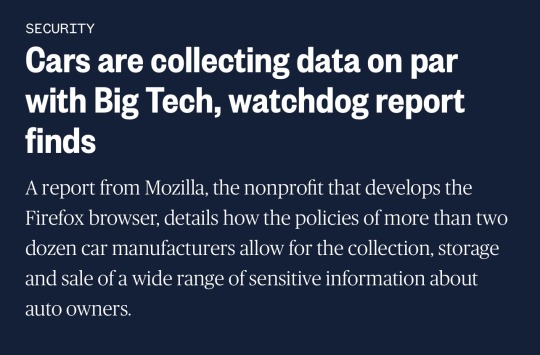
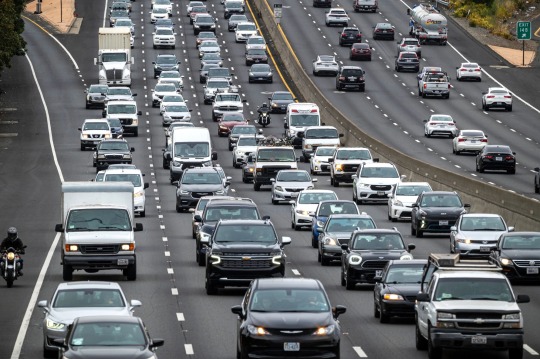
An internet and privacy watchdog has a warning: Your car is tracking you, and it’s collecting far more information than it needs just to get you where you’re going.
Mozilla, the nonprofit that develops the Firefox browser, released a report Wednesday detailing how the policies of more than two dozen car manufacturers allow for the collection, storage and sale of a wide range of sensitive information about auto owners.
Researchers behind the report said that cars now routinely collect data on par with tech companies, offer few details on how that data is stored and used, and don’t give drivers any meaningful way to opt out.
“Cars are a humongous privacy nightmare that nobody’s seemingly paying attention to,” said Jen Caltrider, who directs Privacy Not Included, a consumer privacy guide run by Mozilla. “And they’re getting away with it. It really needs to change because it’s only going to get worse as cars get more and more connected.”
Unlike Europe, the U.S has few meaningful regulations on how companies trade and store personal data. That’s led to a bustling industry of companies that buy and sell peope’s information, often without their knowledge.
Carmakers have a long list of personal information they say they may track, including employment and purchasing history, education, internet browsing history, location data, music and podcast listening habits, immigration status, religious and philosophical beliefs and health information.
(continue reading)
#politics#smart cars#privacy rights#data mining#spyware#capitalism#surveillance state#connected cars#4th amendment#fourth amendment#4th amendment violations
118 notes
·
View notes
Link
“Correctional facilities across the country have a variety of rationales they use to justify this, but largely it boils down to the fact that scanned electronic mail is easier to surveil than physical mail. NYC’s plan is ostensibly in response to a spike in overdoses in NYC’s jail system.”
“Council members also had privacy concerns should mail be recorded off-site by a private contractor. [...] Such data can be retained far into the future and be used against people even if they have never been charged with a crime, have been released from jail, or have had charges dismissed...”
“Previous attempts to digitize mail have resulted in first amendment lawsuits.”
#vice#civil rights#right to privacy#prison reform#us prisons#mail#fourth amendment#4th amendment#prisoners rights#prison industrial complex#human rights#first amendment#1st amendment
143 notes
·
View notes
Link
Basically this means that your 4th amendment rights are gone due to a bunch of loopholes.
The police, border patrol, etc can now search your house without a warrant, and if you try to report it the same police/etc will be the ones investigating their own people, which basically means that they will never be punished for their own crimes against your rights to not have your house searched without a warrant.
Edit: This may only be if you live in a state on the edge of America. But you know that they won’t give a shit about that detail. Map
The implications that people are coming into America from “hopping the border” in California is hilarious though.
#4th amendment#police#acab#border patrol#1312#the police#cops#fuck the police#defund the police#supreme court#republicans
306 notes
·
View notes
Text
This Will Change Policing In America
youtube
#police corruption#police#law enforcement#police state#traffic stop#attorney shield#civil rights#constitution#4th amendment#5th amendment#Youtube
6 notes
·
View notes
Text
Biden Opposes Bill That Would Keep Cops and Feds From Buying Your Data
The Fourth Amendment Is Not For Sale Act would prevent law enforcement and intelligence agencies from purchasing data that they would otherwise need a warrant to obtain.
A bipartisan group of lawmakers is once again trying to keep the government from performing an end run around the Fourth Amendment by buying people's personal data. This week, President Joe Biden indicated that he opposed the bill.
H.R. 4639, known as the Fourth Amendment Is Not For Sale Act, "expands prohibited disclosures of stored electronic communications" to include purchases of data by law enforcement and intelligence agencies.
First introduced in 2021 by Sens. Ron Wyden (D–Ore.), Rand Paul (R–Ky.), Patrick Leahy (D–Vt.), and Mike Lee (R–Utah), the bill has been reintroduced in subsequent sessions. The current version was introduced in the House by Rep. Warren Davidson (R–Ohio) and in the Senate by Wyden and Paul.
On Wednesday, Rep. Jerrold Nadler (D–N.Y.), ranking member of the House Judiciary Committee and one of the House bill's cosponsors, affirmed his support on the House floor. "That anyone should have Americans' private information is highly troubling to me," Nadler said. "But that our federal government can obtain it without a warrant should be troubling to all of us."
On Tuesday, the White House announced that the Biden administration "strongly opposes" the bill. According to a Statement of Administration Policy, the bill "generally would prohibit the Intelligence Community and law enforcement from obtaining certain commercially available information—subject only to narrow, unworkable exceptions."
The Stored Communications Act forbids technology companies from disclosing certain subscriber information, including to the government. But certain types of data—including search histories, credit reports, employment records, and cellphone geolocation data—is "commercially available" and can be sold by third parties called data brokers. Often this data is purchased by private companies in order to better tailor their ad spending.
Governments typically need a warrant to access any of that type of information—as recently as 2018, the Supreme Court affirmed in Carpenter v. United States that the government cannot access a person's cellphone location data without a warrant. "Although such records are generated for commercial purposes," wrote Chief Justice John Roberts, that alone did not "negate" the plaintiff's expectation of privacy. "We decline to grant the state unrestricted access to a wireless carrier's database of physical location information."
Put simply: Come back with a warrant.
But instead of honoring that decision, law enforcement and intelligence agencies just started buying the information from data brokers instead: The National Security Agency (NSA) buys people's internet metadata, and agencies within the Department of Homeland Security—including Immigration and Customs Enforcement (ICE) and Customs and Border Protection (CBP)—purchase cellphone location data.
Even agencies without an explicit law enforcement mandate have gotten in on the fun: In one example, the Centers for Disease Control and Prevention (CDC) paid $420,000 for cellphone data in order to monitor compliance with COVID-19 lockdown measures.
The Fourth Amendment Is Not For Sale Act would ban these transactions. Regarding customer and subscriber records obtained without a warrant, the bill "prohibits law enforcement agencies and intelligence agencies from obtaining the records or information from a third party in exchange for anything of value (e.g., purchasing them)." It further prohibits other government agencies from sharing that information and prevents the records from being used in "any trial, hearing, or proceeding."
Again, this should not be controversial: The Fourth Amendment requires law enforcement to get a warrant based upon "probable cause, supported by Oath or affirmation," before searching one's "persons, houses, papers, and effects."
[keep reading]
3 notes
·
View notes
Text
Do these people not understand the reasoning behind roe v wade?
It doesn't matter that abortions themselves were never mentioned in the constitution (hell, neither was judicial review but here we are). What matters is that the 4th amendment protects our right to privacy. They said that the government shouldn't be able to ban abortions wholeheartedly because it is a medical decision made between a pregnant person and their doctor and the government doesn't need to be a part of that decision.
#roe vs. wade#supreme court#abortion mention#abortion rights#medical privacy#4th amendment#us politics
95 notes
·
View notes
Text
In 2007, Reginald Lane shot and killed Jwonda Thurston, his pregnant girlfriend. For the murder, he was sentenced to life in prison, following state statute for someone who is found guilty of killing “more than one victim.”
On Thursday, the Illinois Supreme Court heard arguments in Lane’s case, specifically around whether Lane was given the appropriate sentence. Lane’s appeal hinges, in part, on whether Thurston’s unborn child can be considered a “victim” of the murder and, more broadly, whether it can be considered an “individual” under the law.
“As it stands now, the unified code of corrections defines a victim as any natural person who suffered direct harm,” Talon Nouri, an attorney representing Lane, told the Justices. “And again, the statute on statutes notes that whenever the word ‘person’ or ‘individual’ is used, that person must have first been born alive.”
Nouri also cited the state’s Reproductive Health Act, a 2019 law that, among other things, stipulates fetuses do not have independent rights in the state of Illinois.
In addition to the question of what constitutes a “victim” under state law, Nouri also argued Lane’s sentence was inappropriately applied because the lower courts had sentenced Lane in alignment with the sentence for a double murder.
Lane was convicted of both first-degree murder and killing an unborn child – also called feticide – which are two distinct crimes.
“While the penalty section of the ‘intentional homicide of an unborn child’ statute states that the sentence shall be the same as for first degree murder, the relevant statutes and definitions unambiguously exclude intentional homicide of an unborn child from this double murder sentencing statute,” Nouri told the court.
Assistant Attorney General Josh Schneider, who argued the case on behalf of the state, relied on the statute’s language identifying the sentence for feticide as being the same as murder.
“When a person is convicted of intentional homicide of an unborn child, the sentence they receive for that offense is the same sentence they would receive if they had been convicted of first-degree murder under those same circumstances,” Schneider said.
Several Justices interrogated that line of reasoning.
“So we really don’t even need to go to these definitions in the other statutes because the legislature has directed us to apply the same sentence as in murder?” Justice Lisa Holder White asked of Schneider.
“That’s exactly right,” Schneider replied.
The Justices took the matter under consideration with a ruling to come at a later, unspecified date.
STOP AND FRISK
The justices on Thursday also considered the case of Francisco Lozano.
In 2018, Lozano was the subject of a “Terry stop,” sometimes also known as a “stop and frisk” or “field interview” in Chicago’s East Garfield Park neighborhood.
From their unmarked police car, two officers noticed Lozano running on a rainy afternoon with his hands in his pockets. After turning their car around, officers saw him run up the stairs of an abandoned apartment building before stopping him and finding that he had a car radio, two screwdrivers and a wallet.
As a result of this stop, Lozano was eventually found guilty of burglary to a vehicle and possession of burglary tools.
Lozano’s lawyer, Pamela Rubeo, argued the police violated Lozano’s 4th Amendment right against unlawful search and seizure by stopping him for “running in the rain.”
“The parties agree the officers needed reasonable suspicion of criminal activity at the inception of this stop,” Rubeo told the court. “Here, no such reasonable suspicion existed.”
Assistant Attorney General Jalan Jaskot, who argued on behalf of the state, told the Justices that police had reasonable suspicion by the time they stopped Lozano, citing the behavior that police observed as they approached Lozano for the stop.
This received some pushback from Chief Justice Mary Jane Theis, who referenced the lower court’s opinion on the case.
“According to the officer’s own testimony, the reason why he stopped him was to conduct a field interview and ask him why he was running,” Theis noted during oral arguments. “Why shouldn’t we just accept that was the basis of the stop – as the officer himself described – and evaluate whether that was an appropriate Terry stop?”
Jaskot responded that the officers saw Lozano “flee” to the abandoned building when they turned their car around and that while they were approaching, they saw a “bulge” in Lozano’s front sweatshirt pocket, giving them reasonable suspicion for a Terry stop.
“If the facts of this case were simply that the defendant was running in the rain, officers would not have the reasonable suspicion to conduct that Terry stop,” Jaskot said after further questioning on the subject from the Justices. “However that is not all that we have. Very importantly, we also have the defendant’s evasive behavior where he did change that direction and run towards this building that appeared abandoned.”
Rubeo also argued that some evidence in Lozano’s trial was inappropriately introduced, as it was taken from statements Lozano gave during his arrest, without being given a “Miranda warning,” a set of notifications police are required to give people they arrest. These notifications include the right to remain silent, the right to an attorney and the warning that anything a defendant says can be used against them in court, among other things.
In their court filing, the attorney general’s office argued that Lozano forfeited the chance to suppress the statements he made before being given a Miranda warning because his lawyers failed to bring it up in his trial.
The case will also be considered by the Justices, although there is not a set timeline for how long they will take to deliver a final opinion.
‘RIDING THE CIRCUIT’
The Justices did not hear arguments for these cases at their typical venue at the Supreme Court’s building in Springfield. Rather, the court was “riding the circuit” and heard arguments on the campus of Chicago State University on Chicago’s South Side.
The court uses a version of the historical practice of judges traveling to district courts to “raise public awareness and confidence in the judicial branch,” according to Theis.
It’s a practice that had been temporarily stalled in recent years amid the COVID-19 pandemic. The court held a virtual “riding the circuit” program in 2021 in conjunction with schools from the state’s Second Judicial District in northern Illinois. The court’s previous in-person road trip took place in Sept. 2019 when arguments were heard at Lewis & Clark Community College in Godfrey.
“It is the first time in our history of this court and our state that we have come to the First District here in Chicago,” Theis told attendees of the arguments on Thursday.
Around 300 students from schools around the region attended the event. Following the oral arguments, students participated in a question-and-answer session with representatives of the Cook County Bar Association.
#us politics#news#capitol news illinois#Illinois#2023#Illinois Supreme Court#Reginald Lane#Jwonda Thurston#double murder#Illinois Reproductive Health Act#feticide#Talon Nouri#Josh Schneider#Justice Lisa Holder White#stop and frisk#Francisco Lozano#Terry stop#field interview#Pamela Rubeo#4th amendment#reasonable suspicion#Justice Mary Jane Theis#Miranda warning
6 notes
·
View notes
Text
Private intelligence collection agencies are profiting off your private personal data whether you use their apps or not, in violation of the 4th amendment and in the interest of “national security”. They invented the threat to national security.
3 notes
·
View notes
Text

"The Fourth Amendment, protects people from unreasonable searches and seizures by the government.."
2 notes
·
View notes
Link
ICE Grabbing Data From Schools and Clinics - this is a violation of human rights and an abuse of power
Democratic response: Give ICE more money!
Republican response: Give ICE more money!
Don’t tell me either major party cares about rights, immigrants, government accountability, or even money.
#immigration#immigrants#immigrant rights#immigration policy#immigration reform#ice#dhs#abolish ICE#joseph biden#human rights#4th amendment
3 notes
·
View notes
Text

your 4th amendment rights
3 notes
·
View notes
Text
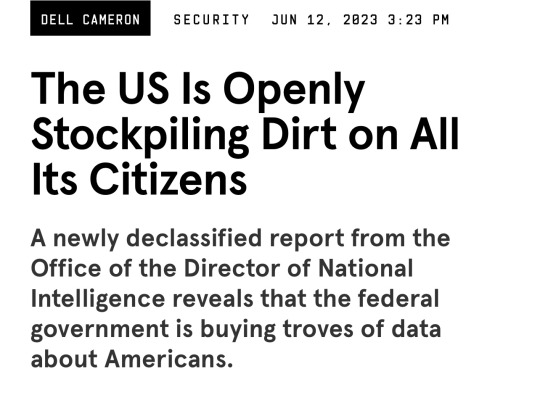
THE UNITED STATES government has been secretly amassing a “large amount” of “sensitive and intimate information” on its own citizens, a group of senior advisers informed Avril Haines, the director of national intelligence, more than a year ago.
The size and scope of the government effort to accumulate data revealing the minute details of Americans' lives are described soberly and at length by the director's own panel of experts in a newly declassified report. Haines had first tasked her advisers in late 2021 with untangling a web of secretive business arrangements between commercial data brokers and US intelligence community members.
What that report ended up saying constitutes a nightmare scenario for privacy defenders.
“This report reveals what we feared most,” says Sean Vitka, a policy attorney at the nonprofit Demand Progress. “Intelligence agencies are flouting the law and buying information about Americans that Congress and the Supreme Court have made clear the government should not have.”
In the shadow of years of inaction by the US Congress on comprehensive privacy reform, a surveillance state has been quietly growing in the legal system's cracks. Little deference is paid by prosecutors to the purpose or intent behind limits traditionally imposed on domestic surveillance activities. More craven interpretations of aging laws are widely used to ignore them. As the framework guarding what privacy Americans do have grows increasingly frail, opportunities abound to split hairs in court over whether such rights are even enjoyed by our digital counterparts.
“I’ve been warning for years that if using a credit card to buy an American’s personal information voids their Fourth Amendment rights, then traditional checks and balances for government surveillance will crumble,” Ron Wyden, a US senator from Oregon, says.
(continue reading)
#politics#police state#mass surveillance#privacy rights#surveillance state#data mining#4th amendment#4th amendment rights
88 notes
·
View notes
Text
I understand that the solution to political corruption isn't "political corruption, but for our side this time," but I'm surprised that that has never been weaponized by our side before. Their side packs courts and rigs juries to throw political opponents in jail, or they simply send armed goons to mow them down and have the courts decide that it's okay for armed goons to do that, but our side never fights dirty like they do. The Department of Justice has infinite resources at its disposal and could theoretically lock anyone it wants in a dark hole for the rest of their miserable lives "without the right of correspondance," but it never goes after big fish, only easy minnows. If and when Republicans take back power, do you think they're gonna show restraint? People were getting blackbagged into windowless vans in 2020! We are a few years away from "free helicopter rides," and the people with the power to prevent that from happening are afraid to do anything, lest they invite retaliation later. Our side doesn't want to throw its weight around, but their side will not hesitate to crush us like fucking bugs.
It is so easy for the powers that be to destroy the lives of normal people, but they never destroy the lives of the higher ups. The masses live in fear, while the few sit back and relax because they know they're untouchable. They violate and strip away our rights like they're nothing, but they never do that to anyone important. The upper classes are completely insulated, protected from the repercussions of their own actions. Look at today's Supreme Court ruling; they decided that the 4th Amendment doesn't apply within 100 miles of a border or coast. The feds can break into your home to search and seize whatever they want, because 6 rightwing nutjobs decided that living within 100 miles of an entrance into the country counts as probable cause. 60% of the country lives in that strip, including the entire state of Florida, most of California, and a large swathe of Texas, but do you think anyone who deserves to be raided will be, or do you think they'll use it as an excuse to go after more minnows? Feds could raid Mar-a-lago TODAY, but they never will because they ultimately don't want to. And let's not forget Breonna Taylor, where conservatives agreed that cops can just kill anyone they want with no repercussions as long as they claim it was an accident after the fact; "we broke into the wrong house and murdered an innocent woman, but we can't be punished because we totally didn't mean to do it. It was nobody's fault! Shit happens." How many more innocent people are going to have their homes ransacked and get murdered because it's not illegal unless you can prove what the gunman was thinking? How many activists will be gunned down by cops who can hide behind the bulletproof excuse of "whoops, wrong address?" It'll never happen to a guilty person. No cops will ever storm a governor's mansion or a congressman's beach house. No senators will ever have their necks knelt on. No billionaire sex traffickers or their clients will ever have their rights violated (except when it threatens to reveal information on another billionaire; Epstein didn't kill himself).
No white guys have ever been sentenced to death by an all black jury.
Justice is a myth.
I'm so tired.
#4th amendment#guns#politics#political#rant#scotus#1/6 committee#corruption#justice#nothing means anything#everything is shit#the rules don't apply to the rich and powerful
9 notes
·
View notes
Text
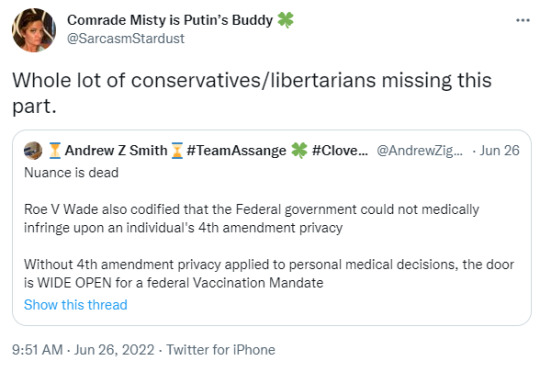
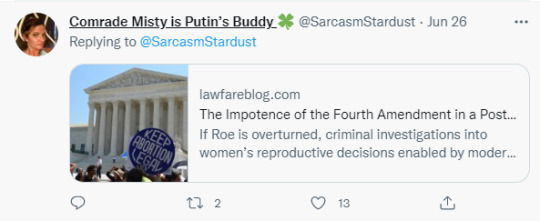
The consequences of playing team sports
3 notes
·
View notes
Text
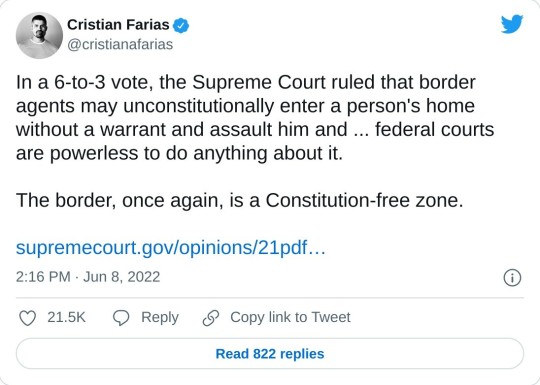
Second Amendment? Sacred!
Fourth Amendment? Not so much...
2 notes
·
View notes